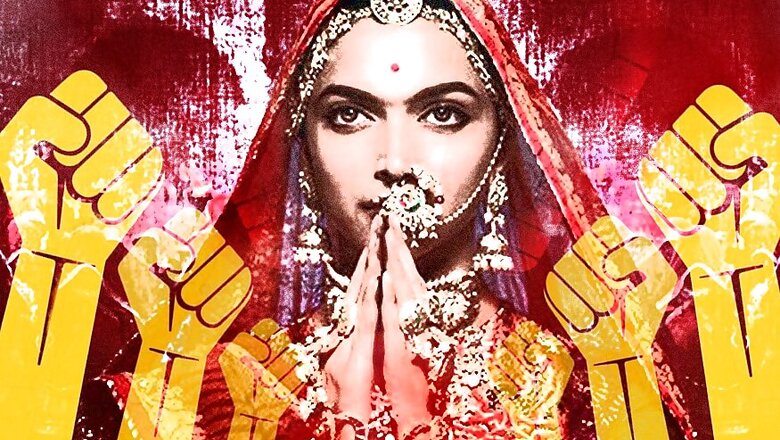
views
New Delhi: It all started with the fringe outfit Karni Sena assaulting ace Bollywood director Sanjay Leela Bhansali and vandalizing the sets of Padmavati in January. This was the first time people were hearing of the now famous Karni Sena and their idea of Rajput history. Ten months on, Bhansali, Deepika Padukone and Karni Sena have come a long way, with new threats of maiming and beheading actors and directors being discussed publicly.
As the movie approached its release date, which has now been deferred, the intensity of such attacks and threats went up and started coming from political leaders too, apart from different religious outfits.
While producer Viacom 18 has decided to “voluntarily defer” the release of the movie, News18 tries to piece together the threats and attacks the movie has faced and if at all the Indian law can be of any help.
Threat 1: Threat to Mutilate the Lead Actress
President of Rajasthan’s Karni Sena, Mahipal Singh Makrana, while referring to the episode of Surpanakha in Ramayana, where Laxman had chopped off the nose of Surpanakha, said that his outfit would not hesitate to do the same with Deepika Padukone, the actress playing the role of the Rajput Queen in the movie.
In Legal Terms – The act of threatening to chop off the nose of a person amounts to the offence of grievous hurt if not causing death. Under IPC Section 506, it is a criminal offence. The section states that “whoever commits the offence of criminal intimidation shall be punished with imprisonment of either description for a term which may extend to two years, or with fine, or with both”.
The section further mentions that if the threat causes grievous hurt, then the accused may be imprisoned for a term extending up to seven years or fine or both.
The above offence is dealt under criminal law, however, it can also be dealt as per civil law. Assault is defined as, “the apprehension of infliction of battery.” This precisely means that if the accused has done something which makes the victim reasonably afraid of infliction of battery on him/her, then the accused can be sued as battery qualifies as a direct threat of force.
Attack 2: Reward For Beheading Deepika Padukone and Sanjay Leela Bhansali
The intensity of vitriol against the yet to be released movie scaled new heights when a BJP office bearer from Haryana said he would double the bounty on the heads of actor Deepika Padukone and filmmaker Sanjay Leela Bhansali to Rs 10 crore. Earlier, a Meerut-based businessman had announced a reward of Rs 5 crore.
Surajpal Amu, the party's chief media coordinator also threatened to "break the legs" of Ranveer Singh, who plays the role of Alauddin Khilji, the legendary Delhi Sultan.
In Legal Terms — The comment attracts a series of penal provisions, firstly, under Section 506 of IPC. Issuing such threats is a criminal offence as the section states that “whoever commits the offence of criminal intimidation shall be punished with imprisonment of either description for a term which may extend to two years, or with fine, or with both”.
The threat of beheading someone tantamount to murder threat and can be dealt accordingly. Since the statement was made to a jeering crowd, there is also a palpable threat of ensuing riots. Here, Section 155 of IPC comes into play, where liability of a person for whose benefit the riot is committed, is chalked out.
The comment also attracts a case of criminal intimidation under Section 503 of IPC. The Section states that “whoever threatens another with any injury to his person, with intent to cause harm to that person, commits criminal intimidation.” This has a penalty of imprisonment which runs up to seven years, fine, or both. Along with these, even the section dealing with grievous hurt can be levelled against the one issuing such a threat.
Attack 3: Derogatory Remarks Against Deepika Padukone
After threats, attacks and raging protests by different communities alleging the movie to be a wrongful depiction of Queen Padmini’s life, Deepika Padukone had taken to Twitter to say that “India has regressed as a nation.” Soon, it was reported that Karni Sena convenor Lokendra Singh Kalvi had referred to Padukone as a “naachnewali” (courtesan), for her comment on India regressing.
"The country is not regressing, you are making it so. With folded hands, I beg Deepika not to insult women... Deepika is dancing in the film. Yes, dance, but why are you dancing with less clothing? How are you trying to portray Indian women?" Kalvi reportedly asked.
In Legal Terms — There is no doubt that a reference to a woman as a “naachnewali” or a courtesan has an element of attracting provisions of sexual harassment as defined under the Indian Penal Code (IPC).
Under Section 354 of IPC, the provision defines sexual harassment and punishment for sexual harassment. This section defines that a man may be guilty of committing an offence of sexual harassment if he makes sexually coloured remarks.
Anyone guilty of such an offence can be punished with an imprisonment of over a year, or fine, or both.
Though the Supreme Court had once ruled that this section applies to only penetrative assault, but recent legal jurisprudence suggests that even remarks or comments may come under the umbrella of this section.
Attack 4: Film Sets Vandalised, Sanjay Leela Bhansali Physically Assaulted
When Padmavati was being shot in Rajasthan, Karni Sena members physically assaulted director Sanjay Leela Bhansali and tore his clothes on the movie sets. A Rajput leader later said that Bhansali they had slapped Bhansali and would soon beat him up with shoes. The film sets and expensive equipments were also destroyed in the attack.
A similar incident was repeated after Karni Sena attacked the palace of Rani Padmini in Chittorgarh and smashed the mirrors in which Alauddin Khilji allegedly saw Padmini for the first time.
In Legal Terms — For the act of physically assaulting the director, it is prima facie an “offence of battery”. The act of slapping the director is not assault, but “battery” and is accordingly punishable under civil law.
However, since his short was torn, there was a pending threat of further physical violence, which attracts the provisions of assault. Under Section 352 of IPC, whoever assaults or uses criminal force on any person, shall be punished with imprisonment up to three months, fine, or both.
Moreover, since there was some destruction of property, the accused also becomes guilty of mischief under Section 425 of IPC. The section is meant for someone with the intent to cause loss or damage to a person causes destruction of a property or diminishes the value or utility of a project. It involves imprisonment for three months, fine, or both.
The court, however, reserves the right to take suo moto cognisance of the above on the basis of outraging a woman's modesty, or infringement of a person's Fundamental Right to Profession.
(Please note that no legal action has been initiated in any of the incidents mentioned above till the time of publication.)

















Comments
0 comment